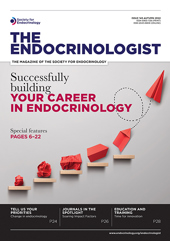Have you ever wondered about a research career in industry? Here, Jane Shepley talks to Nikolaos Nikolaou, who recently left the academic life for a commercial role, about why he made the change, and what he has found different.
Tell us about your career so far
I graduated with a BSc in biology from the University of Patras, Greece, in 2011, before moving to the Centre for Endocrinology, Diabetes and Metabolism of the University of Birmingham, UK, as an MSc student. After finishing my MSc, I worked as research assistant at the University of Birmingham for a couple of years, before moving to the Oxford Centre for Diabetes, Endocrinology and Metabolism for my DPhil, under the supervision of Jeremy Tomlinson and Leanne Hodson. When I completed that, I remained at the University of Oxford as postdoctoral researcher for four more years, before moving to the Department of Pathology, University of Cambridge, for a postdoctoral research associate position.
My research has centred on the role of steroid and bile acid metabolism in non-alcoholic fatty liver disease and hepatocellular carcinoma. Soon after I moved to Cambridge, I was approached by a recruiter looking for senior postdocs with hepatocyte experience. I had been applying for fellowships without great success, and I was concerned about my future career steps, so I made a change.
What is your new role?
In May 2022, I took up the post of Senior Scientist at DefiniGEN Ltd. The company is a spinout from the University of Cambridge, founded by Professor Ludovic Vallier, to provide optimised human cell products to the scientific community. We offer human, induced, pluripotent stem cell-derived (hiPSC) hepatocytes to pharmaceutical clients and academic partners for disease modelling research and drug discovery. We also carry out contract research services, including drug safety and efficacy screens. My role is to direct the development of the company’s disease model portfolio, support phenotypic assays, mentor junior scientists and represent the company at client meetings and scientific conferences.
Had you considered working in industry before?
Not at all – I surprised myself. When I finished my DPhil, I was crystal clear that I wanted to pursue a career in academia, become a principal investigator and establish my own research group. But I soon realised that was tough: getting fellowships is highly competitive, and fixed term contracts were stressing me out. The opportunity came up at the right time and was highly relevant to my research background, so the decision was not difficult.
‘In academia, as a PhD student or postdoc, you are usually working on one, maybe two, projects, with all your energy and focus. Here it is multiple projects, which is quite exciting.’
Has moving to industry been a big culture change?
The company is a spinout from the University of Cambridge, so academics have played an important role, and the environment is not as different as people might expect. The team is highly collaborative, I am still reading papers, staying informed about the literature and applying that knowledge in the lab. We are also encouraged to attend conferences and publish. The biggest difference has been the number of projects that I am simultaneously working on. In academia, as a PhD student or postdoc, you are usually working on one, maybe two, projects, with all your energy and focus. Here it is multiple projects, which is again quite exciting.
What are the advantages of working in industry?
I was tired of moving around and stressed by having to apply for grants every few years. This has given me the stability I wanted.
We are based on the Babraham Research Campus, which provides many opportunities for collaboration. The campus also maintains cutting-edge science facilities that we can use alongside our own, and that allows exposure to lots of new methods that can advance your skillset. Often in academia, if you want to learn a new technique, you need travel to another lab to find it.
The salary has made quite a difference in my life. I do not feel the academic postdoc salary fairly reflects the skillset, years of experience and hard work that you have put in.
The working pattern is also less intense. As a postdoc I was basically working 24/7, but it came with the benefit of flexibility. Here things are more fixed around core hours of 9–5, Monday to Friday, though there is some flexibility. However, I admit I have not adjusted yet – I still stay late for my reading.
Is there anything you miss about academia?
I sometimes miss the scientific discussions over coffee breaks: generating new ideas by chatting with other early career scientists and having the freedom to go and test a new idea in the lab. In industry, your portfolio is fixed, so you do not have that kind of scope to try everything out.
Would I ever cross back? Who knows?! I never close any doors and it is impossible to say what will happen in the years to come.






